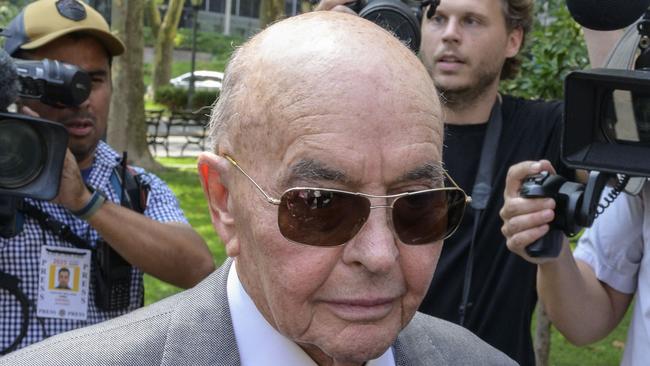AACo reports drop in profit: Optimistic outlook
Beef giant AACo has cooked up its second biggest profit ever, but all eyes remain on how billionaires Joe Lewis and Andrew Forrest may shape the future of the company.
Australia’s biggest wagyu exporter Australian Agricultural Company (AACo) has reported a drop in full year operating profit of 25 per cent, to $50.5m, as it juggled the combination of increased herd size, depressed cattle prices and global cost of living pressures biting into demand.
AACo’s Wagyu beef is a premium product mostly sold into export markets, and the average price it received was down 10 per cent on the previous year, to $19.85 per kilogram.
Chief executive David Harris said while the number was down, it was the company’s second largest operating profit and the second consecutive year profit has been above $50m, adding he was “optimistic” for the current year.
“I’m really optimistic for the future of the business. A couple of good years helps us a lot with that because we’ve had a lot of tough ones before those,” Mr Harris told The Australian.
“It’s about us continuing to be able to keep creeping that profit upwards but also to do that consistently, and to take out the variability that can be associated with the kind of industry that we operate in.”
The consistent profit did not come with a return to shareholders. It’s been more than 15 years since AACo paid a dividend.
Mr Harris said he hoped the return to shareholders would come from an increase in the share price on the back of consistent earnings.
“Ideally, the market will start to see these things and so it’ll play out in the share price and then we should see a positive share price movement,” said Mr Harris. “That’s certainly the way we’ve focused on it.”
For the billionaires who dominate the AACo share register, the dividend may be a secondary concern, coming after the glamour of owning the company which accounts for a whopping 1 per cent of the nation’s land.
Earlier this year Andrew Forrest increased his shareholding in AACo to 19.49 per cent of the beef giant through his Tatterang investment company, having crept up the share register over three years.
It will need to be a patient game for Mr Forrest, as the company already has a 52 per cent shareholder in Bermuda-based British billionaire Joe Lewis, who earlier this year pleaded guilty to insider trading charges in New York.
As a result of his conviction, Mr Lewis is not allowed to have representation on any US publicly-traded companies, but retains his two seats on the board of AACo.

Questions are now being asked about what will come of Mr Lewis’s $9.5bn empire. Most of his wealth is housed in his privately held Tavistock Group, which holds stakes in more than 200 companies across 13 countries including AACo, an Argentinian hydro-electric power plant company called Patagonia Energia, and the Tottenham Hotspur of the English Premier League.
It’s understood there are no current plans for Tavistock to sell out of AACo.
AACo has often been a plaything of the rich and famous, with the Blundy and Holmes a Court families also big shareholders in the past.
Mr Lewis retains two board seats on AACo, but last year his top lieutenant Shehan Dissanayake, who chairs Tavistock, resigned from the AACo board and was replaced by 34-year old Josh Levy, who is now also the co-CEO of Tavistock.
Levy’s father is Daniel Levy, chairman of Tottenham Hotspur.
While the billionaires battle it out for control of the company, AACo has been conducting a strategic review of operations. Mr Harris, who has been CEO for almost two years, said the company has been considering how it could do better, particularly given its expansive land holdings.
“How can we be a better branded beef business and what are the things out there that we could utilise our assets for to build new revenue streams as well?” said Mr Harris.
Some of its properties might be suitable for solar farming and Mr Harris said it was looking further into carbon capture programs.
For now though, it’s all about beef. The industry has been buoyed by better than expected rainfall — in a summer forecast to be dry — and a bounce back in cattle prices from a nine-year low in October last year to now be above the 2015-19 average, according to research by National Australia Bank.
“Australian beef cattle prices are expected to remain elevated over the next year, supported by improved restocker demand on the back of better seasonal conditions and healthy export demand,” said NAB in its Beef Cattle special report.
In the full year just reported, revenue from meat sales rose 10 per cent to $268.7m, while revenue from live cattle sales dropped 1 per cent to $67.4m. Sales were up in Asia and Australia and down in North American, Europe and the Middle East.
The key metric of cost per production of kilogram of beef rose 5 per cent to $2.91 during the period, and AACo said the depressed cattle prices during the year led to a market-to-market fair value drop in the herd of $149.4m.
AACo does not believe this represents a fair representation of the core value of its livestock once it becomes branded beef.
As a result of the markdown in herd value, net assets dropped 3 per cent on the previous year to $1.5bn as this fall outstripped the $78.1m increase in the value of its pastoral land.




To join the conversation, please log in. Don't have an account? Register
Join the conversation, you are commenting as Logout